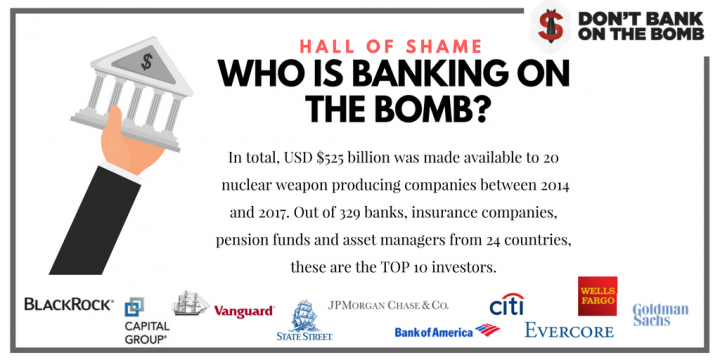Today marked the release by PAX, the Dutch peace organisation, of their annual Don’t Bank on the Bomb report. This year’s report is more relevant than ever given last year’s historic agreement by 122 countries on the text of the Treaty on the Prohibition of Nuclear Weapons, and the subsequent awarding of the Nobel Peace Prize to ICAN – of which PAX is a member – for their work on making it happen. The Treaty is now in the process of signing and ratification and currently counts on 57 of the former and 5 of the latter.
The report has discovered investments of 525 billion dollars made available by some 329 financial institutions to 20 nuclear weapons companies working for the governments of the United States, the United Kingdom, France and India[1]. Clearly this accounts for only four of the nine nuclear-armed states. Information for Russia, China, Pakistan, Israel and North Korea is not available in the report, but given that these five account for around 50% of the world’s nuclear arsenal, the financing identified in this report is only a partial reflection of the true extent of the problem. One is left to wonder what could be achieved in the field of global development were this money to be made available for financing a peace economy.
Nevertheless, the numbers represent an increase of $81 billion on last year’s report, but a hope-inducing net reduction of 30 institutions.
This year’s top ten worst offending investor groups in the report’s “Hall of Shame” are: Blackrock, Capital Group, Vanguard, State Street, JP Morgan Chase, Bank of America, Citigroup, Evercorp, Wells Fargo and Goldman Sachs, which between them account for $254 billion, and this investment support takes various forms such as loans, investment banking and share or bond ownership.
It remains to be seen how financial institutions will react in the coming months because this financial support will shortly be outlawed for states parties to the new treaty given that upon ratification its article 1(e) will come into force which says that “Each State Party undertakes never under any circumstances to assist, encourage or induce, in any way, anyone to engage in any activity prohibited to a State Party under this Treaty”.
Some early indications are that the Treaty will have a positive effect as two of the five largest pension funds in the world (ABP in the Netherlands and the Norwegian Government Pension Fund) have announced changes in their relationships with nuclear weapon producers.
“If you have been wondering who benefits from Donald Trump’s threats of nuclear war, this Report has that answer,” said ICAN Executive Director Beatrice Fihn. “These are the companies that stand to profit from indiscriminate mass murder of civilians. We grow less safe while they cash in on chaos by banking on Armageddon.”
“A new nuclear arms race has moved the Doomsday Clock closer to Armageddon, but it has also started a new nuclear gold rush for those wanting to cash in on mass destruction,” she added.
While this report found a massive increase of investment in mass destruction, it also profiles 63 financial institutions with policies limiting or prohibiting investment in any type of nuclear weapon producer.
Susi Snyder, of PAX and co-author of the report highlighted the positive findings: “The Nuclear Ban Treaty has sparked momentum towards divestment, shown by 10% fewer investors in nuclear weapons, and an increase in financial institutions comprehensively prohibiting any investment. Investments are not neutral, these companies should be congratulated for standing on the side of humanity.”
When asked about what ordinary people who aren’t Chief Financial Officers in multinational corporations can do to support the movement towards divestment by financial institutions from nuclear weapons companies, Ms Snyder added, “Banks and pension funds need their clients more than they need investments in weapons of mass destruction. They can and do change their policies based on client demand. Anyone can use the report to find out if their bank is investing, and can then use the power of their wallet to get the bank to change!”
[1] The 20 identified major nuclear weapons companies are:
For the United States: Aecom, Aerojet Rocketdyne, BAE Systems, Bechtel, Boeing, BWX Technologies, CH2M Hill, Fluor, General Dynamics, Honeywell International, Huntington Ingalls Industries, Jacobs Engineering, Lockheed Martin Northrop Grumman, and Orbital ATK.
For the United Kingdom: Aerojet Rocketdyne, BAE Systems, Boeing, BWX Technologies, CH2M Hill, General Dynamics, Honeywell International, Jacobs Engineering, Lockheed Martin, Northrop Grumman, Orbital ATK, and Serco.
For France: Airbus, BAE Systems, Safran, and Thales.
For India: Larsen & Toubro.










